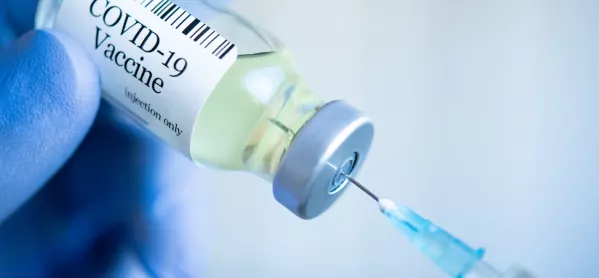The offer of Covid-19 vaccines to 12- to 15-year-olds would seem on paper to be a matter purely for discussion between parents and their children.
But, with some schools receiving letters from concerned parents threatening legal action should their children be vaccinated against their permission, there has been real worry that schools may be caught in the crossfire.
Government guidance has now been published and makes clear what schools’ responsibilities are on this issue.
The guidance explains that the vaccination programme will take place on school premises, in common with other school vaccination programmes, and be operated by the School Age Immunisation Service (SAIS).
Caught in the crossfire
This means schools are chiefly responsible for providing the premises for the deployment of the vaccine programme by medical professionals, providing details of the school roll to SAIS and sending out consent forms to parents.
However, as noted, schools still face the risk of being caught in the middle should a parent not want their child to be jabbed, with letters warning of legal action should the child receive the vaccine while at school.
But, many parents are often unaware that their child has the legal right to be vaccinated without their consent - something that is known as the Gillick competency test.
This is something teachers should be aware of, too. So, what is it?
What is ‘Gillick competency’?
For those too young to remember, Gillick competence was established in 1985 after the eponymous Victoria Gillick took legal action to prevent contraception being given to under 16s without parental consent or knowledge.
Gillick’s claim was ultimately dismissed after a lengthy legal battle but the case established a legal precedent.
Fast-forward 35 years and Gillick competence again comes to the fore - this time to assess whether under 16s can make their own decision whether to have the Covid-19 vaccination should their parents disagree and vice versa.
Gillick is applied in cases where it is necessary to assess whether a child has the maturity to make their own informed decisions based on an understanding of the implications of their decisions.
Factors that health professionals will take into account include the following:
- The child’s age, maturity and mental capacity.
- Their understanding of the issue and what it involves - including advantages, disadvantages and potential long-term impact.
- Their understanding of the risks, implications and consequences that may arise from their decision.
- How well they understand any advice or information they have been given.
- Their understanding of any alternative options, if available.
- Their ability to explain a rationale around their reasoning and decision making.
If the healthcare professional deems all this to be the case, it means the child can be vaccinated on a school site without parental consent.
This is not something schools need to be involved in at the time and, indeed, schools may not be told if a child was assessed for Gillick competence.
However, there is, of course, the risk a family may threaten legal action for allowing the vaccination to take place, although this would appear to be baseless.
By schools familiarising themselves with Gillick competence and referring concerns about consent to the relevant health professionals, schools leaders should be reassured it is not an area where they need to be unduly concerned by any legal risk.




